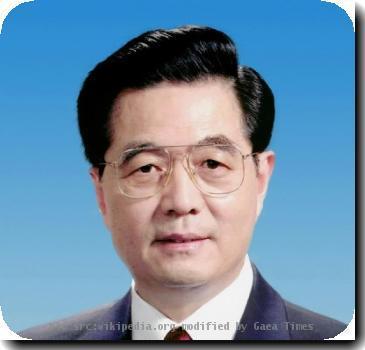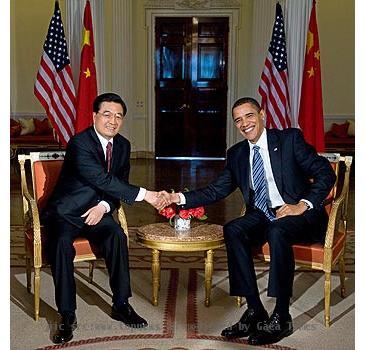NKorea’s Kim Jong Il leaves China after affirming nuke disarmament talks but no dates set
By Christopher Bodeen, APFriday, May 7, 2010
Kim leaves China after affirming nuke talks
BEIJING — North Korean leader Kim Jong Il left China on Friday after a secretive five-day visit that reaffirmed the importance of long-delayed nuclear disarmament talks but produced no firm dateline for rejoining that process.
Kim’s armored train crossed the border back into North Korea midmorning after leaving Beijing Thursday following talks with Chinese leaders that touched on the six-nation denuclearization talks stalled since December 2008.
“Kim said that the DPRK will work with China to create favorable conditions for restarting the six-party talks,” the official Xinhua News Agency said in a report on his meeting with Chinese President Hu Jintao.
The visit began Monday and has been shrouded in secrecy in keeping with Kim’s reclusive ways. In footage run by Chinese state broadcaster CCTV, Kim, 68, who reportedly suffered a stroke in 2008, appeared thin but relatively vigorous in meetings with Chinese President Hu Jintao, Premier Wen Jiabao, and other officials.
Kim, wearing a pea green leisure suit, was shown shaking hands with Chinese leaders at Beijing’s Great Hall of the People, in footage apparently shot Wednesday night. He exchanged comments with Hu in a conference room, then stood and read from a piece of paper at a banquet table and exchanged toasts, wine glass in hand.
Other footage showed him visiting a biotechnology firm accompanied by Hu, during an excursion to Beijing’s Zhongguancun high-tech zone believed to have happened Thursday morning. The eccentric Kim is known to shun air travel and travels entirely by road and rail.
The Korean Central News agency said in a dispatch from Pyongyang that Kim made the “unofficial” visit starting Monday and ending Friday. Kim was seen in China by journalists several times, although Chinese spokesmen repeatedly refused to confirm his presence in the country.
KCNA did not mention a one-on-one meeting with Hu or even a visit to Beijing, where Kim’s motorcade was seen Wednesday and Thursday. It’s description of the visit as unofficial appeared to explain the lack of formal protocol such as an official welcoming ceremony or the flying of North Korean flags in Beijing’s Tiananmen Square.
Kim has grown ever more dependent on Chinese aid and diplomatic support, while Beijing appears determined to provide whatever support necessary to prevent his impoverished regime’s implosion and the potential political chaos that could bring severe unrest to its border.
The KCNA report said Kim toured the northeastern cities of Dalian and Tianjin and met with vice premier Li Keqiang and other officials.
“The leader of the DPRK received a sincere and warm welcome from Chinese people wherever he went in China,” KCNA said. “Kim Jong Il expressed satisfaction over the result of his visit.”
This week’s visit was Kim’s fifth to China since succeeding his father as ruler in 1994, the last being in 2006.
South Korea’s Yonhap news agency reported that Kim told Hu he is ready to return to denuclearization talks, under which North Korea agreed to dismantle its nuclear programs in return for food and fuel aid. Kim has similar things in past, but usually with attached conditions, such as a long-sought direct dialogue with the United States. Yonhap did not say what, if any, conditions he set this time.
North Korea quit the talks, involving China, Russia, the two Koreas, Japan and the U.S., a year ago and then conducted a nuclear test that drew tightened U.N. sanctions.
A return to the talks is likely to go hand-in-hand with new aid, including the implementation of economic agreements reached during a visit by Wen to North Korea last year.
Xinhua said Wen told Kim the two enjoyed “big potential for developing economic and trade cooperation,” singling out the need to speed up development of infrastructure along their borders.
China, which sent troops to back North Korea during the 1950-53 Korean War, already provides most of the aid needed to feed North Korea’s malnourished population of 23 million and prop up an economy devastated by natural disasters and chaotic management — most recently a currency revaluation that backfired disastrously.
Beijing’s support for Kim is driven overwhelmingly by its own security concerns, which override any unhappiness it might have over North Korea’s nuclear program or rejection of economic reforms, Chinese scholars say.
“No matter how different its opinions are from those of the North Koreans, and how much unhappiness it has toward them, the Chinese government will not leave North Korea to implode, and it will not let the strategic balance of the Korean peninsula be broken,” said Cai Jian, deputy director of the Center for Korean Studies in Shanghai’s Fudan University.
That, however, comes at the risk of upsetting South Korea, where suspicion is rising that a North Korean torpedo destroyed the naval ship Cheonan in March, killing 46 sailors. North Korea has denied involvement.
The timing of Kim’s China visit has aroused some complaints among South Korean politicians, who say it shows insensitivity toward the Cheonan victims. South Korean officials have asked that China play a “responsible role” in the aftermath of the sinking and keep them informed of Kim’s activities in China.
Associated Press Writers Kwang-tae Kim and Jean Lee in Seoul and researcher Zhao Liang in Beijing contributed to this report.
Tags: Asia, Beijing, China, East Asia, Greater China, Hu Jintao, North Korea, Political Issues, South Korea, Weapons Administration

